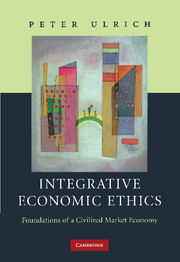Book contents
- Frontmatter
- Contents
- List of figures
- Preface
- Translator's note
- Introduction: orientation in economic-ethical thinking
- Part I Fundamental concepts of modern ethics and the approach of integrative economic ethics
- 1 The phenomenon of human morality: the normative logic of interpersonal relations
- 2 The moral point of view: philosophical developmental lines of rational ethics
- 3 Morality and economic rationality: integrative economic ethics as the rational ethics of economic activity
- Part II Reflections on the foundations of economic ethics I: a critique of economism
- Part III Reflections on the foundations of economic ethics II: rational economic activity and the lifeworld
- Part IV A topology of economic ethics: the ‘sites’ of morality in economic life
- Bibliography
- Index of subjects
- Index of names
1 - The phenomenon of human morality: the normative logic of interpersonal relations
Published online by Cambridge University Press: 22 September 2009
- Frontmatter
- Contents
- List of figures
- Preface
- Translator's note
- Introduction: orientation in economic-ethical thinking
- Part I Fundamental concepts of modern ethics and the approach of integrative economic ethics
- 1 The phenomenon of human morality: the normative logic of interpersonal relations
- 2 The moral point of view: philosophical developmental lines of rational ethics
- 3 Morality and economic rationality: integrative economic ethics as the rational ethics of economic activity
- Part II Reflections on the foundations of economic ethics I: a critique of economism
- Part III Reflections on the foundations of economic ethics II: rational economic activity and the lifeworld
- Part IV A topology of economic ethics: the ‘sites’ of morality in economic life
- Bibliography
- Index of subjects
- Index of names
Summary
Morality is a specifically human phenomenon about which everyone has intuitive preconceptions resulting from his own practical experience of life. Consequently, what is at issue in questions of morality and ethics can at first best be understood through its elementary significance for the personal and social life of man. We will begin with the determination of the moral disposition of man and its fundamental cultural-anthropological conditions (Section 1.1) and with the basic concepts of ‘morality’ and ‘ethos’ (Section 1.2). The basic concerns of modern philosophical ethics can then be elucidated from a cultural-historical perspective (Section 1.3). This is followed by an attempt to explicate the humanistic core of the universal moral principle, whose justification is the central issue of modern ethics (Section 1.4). From this vantage point it will then be possible to understand the developmental stages of moral consciousness, which every individual goes through in his progress towards becoming a (modern) person capable of moral judgement (Section 1.5).
The moral disposition as part of the conditio humana
Being human means freedom of choice.
It is one of the fundamental ‘conditions for the possibility of human existence’ and an indispensable aspect of the conditio humana that man – and that means in principle every single person – is a being whose behaviour, in contrast to that of other life forms, is not determined by the laws of nature. To a substantial degree it takes the form of deliberate action.
- Type
- Chapter
- Information
- Integrative Economic EthicsFoundations of a Civilized Market Economy, pp. 13 - 42Publisher: Cambridge University PressPrint publication year: 2008

